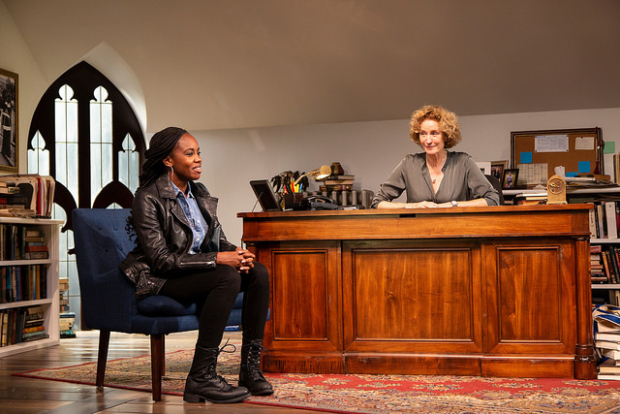Wrestling With Racism and a Generational Divide in The Niceties

(© T. Charles Erickson)
The issue of racism divides a white academic and her black student in The Niceties, the explosive two-hander by Eleanor Burgess now playing at the Huntington Theatre. Both characters in the play are American women with a shared trait: an inability to hear (or listen to) what the other person is saying.
Janine (Lisa Banes) is a 60-year-old, tenured professor at an elite Ivy League university, and Zoe (Jordan Boatman) is her undergraduate student. Zoe has come to Janine's office to discuss a paper she has handed in about the American Revolution. Janine begins her comments quietly, pointing out where Zoe has misplaced a comma or failed to correctly structure a sentence.
But when Janine suggests that Zoe's premise for the paper is flawed, The Niceties erupts into passionate arguments, building to a revenge scenario before the end of the first act. The subject is not only racism but also a power struggle for the equality of all citizens in the university community and, by extension, the world at large.
Zoe's paper proposes that the American Revolution was made possible because of slavery: "The people who were really suffering were the slaves…It was only a moderate revolution because only the upper middle class white and poor whites were happy." When Janine calls her to task because she has not footnoted this "original" notion with hard-copy proof instead of vague, web-based references, Zoe hits back that there are no letters from slave women saying, "I hate being raped."
Janine offers Zoe a week to rewrite the paper according to academic standard, but Zoe refuses. Although she needs at least a B+ grade to graduate with honors, she has no time to spend on revisions because of her protest marches. Zoe claims these pursuits are giving her a better education than the lectures in Janine's course.
Three weeks later, neither Janine nor Zoe have changed their opinions, nor have they allowed the other's declarations to dent their preconceived values. Their conflicting views and mutual deafness to their opponent's pain and self-doubts mirror our current national divide.
The question of who gets to write history is on the table, primed by Janine's reliance on the importance of published books and peer-reviewed articles over feelings and sources on the internet. Zoe's anger at carrying 400 years of slavery and inequality on her shoulders counters Janine's condescending attitude. Although Janine upholds the progress that's slowly been made, Zoe will have none of it.
Banes is believable in her anger and then her confusion, sincerely feeling she is liberal in her thinking. She caves into Zoe's demands until they reach the realm of fantasy through goals that Janine recognizes as unobtainable in contemporary America. Boatman, as the mercurial Zoe, is less self-assured until she remembers what she deserves, although she has been hit by accusations of bad or foolish behavior affecting her future. Both actors draw on their defenses in emotional outbursts, but there is no denying the sense of two talking heads onstage rather than real people.
Director Kimberly Senior has used the subtlety of body positions and stage movement to convey the change in the power structure between the two acts. Cameron Anderson's set design supports this, with an expansive, high-ceiling faculty office, with walls adorned by portraits of revolutionary men, including Nelson Mandela and George Washington. By the start of Act 2, Washington's picture has been removed, one small victory for Zoe.
In The Niceties, however, a lot of wounds may be inflicted, but ultimately no one wins the battle.










